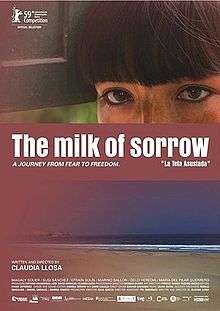The Milk of Sorrow
| The Milk of Sorrow | |
|---|---|
 | |
| Directed by | Claudia Llosa |
| Produced by |
Antonio Chavarrías Claudia Llosa José María Morales |
| Written by | Claudia Llosa |
| Starring |
Magaly Solier Susy Sánchez Efrain Solís |
| Music by | Selma Mutal |
| Cinematography | Natasha Braier |
| Edited by | Frank Gutiérrez |
Release dates |
|
Running time | 95 minutes |
| Country |
Peru Spain |
| Language |
Spanish Quechua |
The Milk of Sorrow (Spanish: La Teta Asustada, The frightened teat) is a 2009 film by Peruvian director Claudia Llosa and co-produced by Peru and Spain. The film stars Magaly Solier and addresses the fears of abused women during Peru's recent history. It won the 2009 Golden Bear award and FIPRESCI prize at the Berlin International Film Festival, as well as the award for best film in the 24 Festival Internacional de Cine de Guadalajara in Mexico. It was nominated for the 82nd Academy Awards for Best Foreign Language Film, becoming the first Peruvian film to be nominated for the award.
Plot
Fausta is suffering from a rare disease called the Milk of Sorrow, which is transmitted through the breast milk of pregnant women who were abused or raped (in times of terrorism, in Peru) during or soon after pregnancy. While living in constant fear and confusion due to this disease, she must face the sudden death of her mother. She chooses to take drastic measures to not follow in her mother's footsteps.
Background
Between 1980 and 1992 Peru experienced a period of extreme violence, particularly in the Andean region, because of the uprising of the Maoist group Sendero Luminoso (Shining Path) and the actions of the paramilitary and state armed forces. By 1990 the conflict had reached Lima, the capital city of Peru. Claudia Llosa refers in her film to the folk belief that the trauma experienced by women who were raped by members of security force was passed on to their children through their breast milk. Thus, this period of violence continues to affect not only those who experienced it but also the next generation.
Llosa's work is a psychological as well as sociological approach to the 12 years of conflict, and is critical of the mass rapes used by the army as a strategy of war. The film is based on the book Entre Prójimos, by Kimberly Theidon.[1][2] In her book, Theidon documents a number of testimonials by women who were raped by as many as thirty men at a time, atrocities that often resulted in pregnancies. Theidon states that "when survivors of sexual violence speak about their experiences, they place a responsibility on their listeners to respond to what they have heard."[3] Llosa's film, too, is an attempt to respond to such testimonies.
Filming
Most of the filming locations are in Manchay, an impoverished suburban area in Pachacamac, southeast of Lima, which indigenous people took over during the 1980s to escape from terrorism, and near a high-class area of Lima called Cieneguilla.
Critical reception
The film received positive reviews, having an 80% certified "fresh" in Rotten Tomatoes and a critical consensus of:"Claudia Llosa's deliberate pace and abstract storytelling may frustrate some viewers, but there's no denying the visual pleasures soaking in The Milk of Sorrow"; Peter Brunette, from Hollywood Reporter, said "The film is gorgeously shot and contains a plethora of haunting images". Boyd van Hoeij from Variety said that "Peruvian realities and Llosa's light magical realism mesh to create a vivid picture of a society and its problems."
While some Peruvian critics gave the movie negative reviews, the plot and performance were praised by American and European critics.
Awards
Film awards
| Year | Category | Person Nominated | Best Movie Nominated (Results) |
|---|---|---|---|
| 2009 Berlin Golden Bear | Best Movie | Claudia Llosa | Winner |
| 2009 Berlin International Film Festival | FIPRESCI | Claudia Llosa | Winner |
| 2009 Guadalajara International Film Festival | Best Movie | Claudia Llosa | Winner |
| 2009 Guadalajara International Film Festival | Best Actress | Magaly Solier | Winner |
| 2009 Montreal World Film Festival | Best Actress | Magaly Solier | Winner |
| 2009 Association Québécoises des Critiques de Cinéma | Best Movie | Claudia Llosa | Winner |
| 2009 Lima Film Festival | Best Peruvian Movie | Claudia Llosa | Winner |
| 2009 Lima Film Festival | CONACINE Award | Claudia Llosa | Winner |
| 2009 Lima Film Festival | Best Actress | Magaly Solier | Winner |
| 2009 Havana Film Festival | Best Movie | Claudia Llosa | Winner |
| 2009 Bogota Film Festival | Best Movie | Claudia Llosa | Winner |
| 2009 Peruvian Association of Cinematographic Press | Best Peruvian Movie | Claudia Llosa | Winner |
| 2010 Goya Awards | Best Spanish Language Foreign Film | Claudia Llosa | Nominated |
| 82nd Academy Awards | Best foreign Language Film | Claudia Llosa | Nominated |
| 2010 Ariel Award | Best Ibero-American Film | Claudia Llosa | Nominated |
Submissions
- 82nd Academy Awards
- Best Foreign Language Film (nominated)
References
- ↑ Interview with Kimberly Theidon by Paola Ugaz from La Terra http://www.terra.com.pe/noticias/articulo/html/act1659267.htm
- ↑ http://www.fas.harvard.edu/~anthro/theidon/index.htm
- ↑ Theidon, Kimberly Susan. Entre prójimos el conflicto armado interno y la política de la reconciliación en el Perú. Lima, Peru: IEP Ediciones, 2004. Pg 130